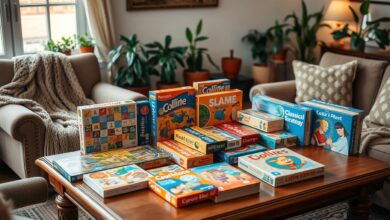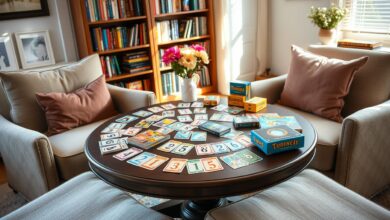How to Start Journaling for Seniors – Beginner’s Guide

Imagine unlocking a treasure chest of memories, emotions, and personal insights—all through writing. Journaling for seniors is more than just writing. It’s a journey of self-discovery and growth that can change your golden years.
Since 2016, I’ve seen the deep impact journaling can have on your life. It helps manage stress, keeps memories alive, and lets you explore your inner world. Journaling is a unique way to understand yourself better.
This guide will show you the world of journaling for seniors. You’ll learn how to start journaling for seniors easily and with purpose. No experience is needed—just an open heart and a desire to explore your thoughts.
Table of Contents
Understanding the Power of Journaling for Older Adults
Journaling can change lives for seniors wanting to feel better mentally and physically. It’s more than just writing. It’s a way to explore yourself and grow.
Journaling is about writing down your thoughts, experiences, and feelings. It’s great for older adults’ mental health. It helps them deal with emotions and keep their minds sharp.
What is Journaling?
Journaling is not just writing. It’s a way to talk to yourself. You can share your thoughts and feelings freely, without fear of judgment.
Mental and Emotional Benefits for Seniors
- Reduces symptoms of anxiety and depression
- Improves overall mood and emotional well-being
- Provides an outlet for processing difficult emotions
- Enhances self-awareness and personal growth
“I write because I don’t know what I think until I read what I say.” – Flannery O’Connor
Physical Health Advantages of Regular Journaling
Journaling has physical benefits too. Studies show it can:
- Boost immune system function
- Reduce stress-related health symptoms
- Improve sleep quality
- Support overall mental and physical wellness
Journaling helps seniors stay mentally sharp and emotionally balanced. It’s a powerful tool for personal growth.
How to Start Journaling for Seniors

Starting a journal can be a fun journey of self-discovery. It’s a way to grow and learn more about yourself. Around 16% of the world’s people write in a journal regularly. This shows it’s a popular way to reflect and improve your mood.
Getting started with journaling is easy. The first step is to not worry about making mistakes. Dr. James Pennebaker says it’s important to make journaling a special part of your day.
Creating Your Journaling Routine
- Choose a consistent time for writing, such as morning or evening
- Select a quiet, comfortable space
- Start with short entries of 5-10 minutes
- Write freely without worrying about grammar or style
“Journaling is not about creating a perfect document, but about exploring your inner world.” – Dr. James Pennebaker
For seniors, journaling is a great way to reduce stress. Studies show that 85% of seniors who journal feel less stressed. They usually spend 15-20 minutes each day writing.
Practical Journaling Techniques
- Begin with simple prompts like “Today I feel…” or “One thing I’m grateful for is…”
- Use a comfortable pen and journal that feels good to write in
- Don’t judge your writing – just let your thoughts flow
- Experiment with different writing styles and topics
More than 70% of seniors like using advanced prompts to explore their feelings. Remember, there’s no wrong way to journal. Your journal is a personal space for you to express yourself and reflect.
Choosing the Right Journal and Writing Tools
Finding the perfect journaling supplies for seniors can make writing fun again. The right tools improve comfort and keep you motivated.
There are two main journaling paths: traditional and digital. Each has its own benefits for seniors wanting to write down their thoughts and memories.
Traditional vs Digital Journaling Options
Traditional journaling offers a hands-on experience many seniors enjoy. Brands like Leuchtturm1917 and Rhodia have great options:
- Softcover composition notebooks (under $3)
- Hardcover spiral journals ($5-$20)
- Various page styles: lined, dot-grid, plain
- Size ranges from compact A7 to full A4
Ergonomic Considerations for Seniors
Choosing ergonomic writing tools can ease hand strain and make journaling more comfortable. Look for pens with:
- Cushioned grip designs
- Smooth ink flow
- Lightweight construction
Recommended ergonomic writing tools include the Pilot Precise G2 Pen and Fisher Space Pen. They provide great writing comfort.
Essential Supplies for Getting Started
Your journaling toolkit should include:
- Comfortable journal with good paper quality
- Ergonomic pen
- Reading glasses
- Well-lit writing space
“Writing is not a matter of time, but a matter of space.” – Julia Cameron
Digital journaling apps are great for tech-savvy seniors. But many prefer handwriting for better thought flow and memory. Choose what you enjoy most and stick with it.
Creating a Comfortable Journaling Environment

Creating a perfect journaling spot is key for seniors who want to write meaningfully. Your writing space should be more than a place—it’s a place for self-expression and thinking.
When setting up your journaling area, think about these important things:
- Choose a quiet spot with few distractions
- Make sure there’s good light, natural or soft
- Find a chair that supports your back well
- Put your writing area at a height that feels right
The right setting can change how you journal. Make your space welcoming and inspiring. Some like a cozy corner with a view, while others prefer a desk near their favorite books.
“Your journaling space should feel like a warm invitation to explore your thoughts and memories.”
Good organization in your journaling area is key. Keep your supplies handy and have a special spot for reflection. Studies show a well-designed space boosts thinking and feelings for seniors.
- Use high-quality, comfy writing tools
- Have a small tray for your journals and pens
- Think about soft music or sounds in the background
- Keep the temperature and comfort just right
The most important thing is to make your journaling area your own. It should be a personal place where you can freely think and keep your memories safe.
Different Types of Journals for Seniors
Journaling is a great way for seniors to explore their experiences, memories, and feelings. Each journal type has its own benefits. They help older adults stay sharp mentally and emotionally.
Gratitude Journaling: Cultivating Positivity
Gratitude journaling helps seniors see the good in life. By writing down daily thanks, you can:
- Reduce anxiety
- Boost overall well-being
- Improve mental resilience
- Enhance emotional clarity
“Writing about gratitude takes just five minutes but can transform your perspective.” – Journaling Expert
Memory and Legacy Journals: Preserving Personal History
Memory journals for the aging are a treasure trove of life stories. They help you:
- Document family stories
- Capture personal achievements
- Create a lasting legacy
- Connect with younger generations
Daily Reflection Journals: Processing Everyday Experiences
Daily reflection journals offer a way to understand your thoughts and feelings. Writing every day helps you track your growth, manage stress, and gain self-insights.
Choosing gratitude journaling, memory preservation, or daily reflections is key. Find a journal that fits your journey and brings you happiness.
Simple Techniques for Regular Writing Practice
Starting a daily journal can change a senior’s life. It brings mental joy and emotional health. You don’t need complex techniques to enjoy writing.
Here are simple ways for seniors to begin writing:
- Start with 5-10 minute writing sessions each day
- Try stream-of-consciousness writing to avoid self-criticism
- Use prompts that spark memories and creativity
Writing prompts for older adults are very helpful. Ask yourself:
“What made me smile today?”
These questions help you remember and think deeply. Studies show writing can boost your mind, spark creativity, and release emotions.
- Try list-making as a different journaling method
- Focus on keeping up a habit, not on perfect writing
- Explore different writing styles
Your journaling is unique. There’s no right or wrong way to journal. What matters most is enjoying the habit and exploring your thoughts.
Begin slowly, be kind to yourself, and enjoy the writing journey.
Therapeutic Benefits and Stress Management Through Journaling
Journaling is a great tool for seniors looking to reduce stress and heal emotionally. It offers a special way to handle anxiety and boost mental health.
Studies have shown journaling’s benefits for seniors. They found that regular writing can greatly improve both mental and physical health:
- Decreased mental distress when writing for 15 minutes, three days a week
- Improved immune function through expressive writing
- Reduced likelihood of seeking medical treatment
Managing Anxiety and Emotions
Journaling helps seniors deal with anxiety by putting thoughts into words. It creates a space to process feelings. Writing becomes a safe space to process complex feelings and understand personal experiences more deeply.
“Journaling is like whispering to one’s self and listening at the same time.” – Mina Murray
Improving Sleep Quality Through Writing
Writing before bed can calm your mind. Seniors who journal about their day often sleep better. It helps clear your mind, leading to more restful nights.
Building Mental Resilience
Regular journaling strengthens your mental health. It helps you document challenges and growth. This builds resilience and helps cope with tough times.
Remember, your journal is a personal sanctuary – a place without judgment where healing begins.
Memory Preservation and Family Legacy Writing
Writing down memories is a great way for seniors to share their life stories. It helps create a lasting family legacy. Your experiences are full of wisdom that should be passed on.
Legacy journals for seniors are a fantastic way to record important moments. They are more than memory books. They connect generations.
“Our stories are the threads that weave family history together.”
When starting your family history journal, keep these tips in mind:
- Collect personal photographs and significant mementos
- Write about major life milestones
- Include personal reflections and emotional experiences
- Record family traditions and cultural heritage
Digital tools can make preserving memories easier. Sites like Shutterfly, Mixbook, and Canva help you create beautiful memory books. They offer easy design options.
Writing your memoir has many benefits. It:
- Improves cognitive function
- Promotes mental agility
- Fosters deeper family connections
- Supports emotional well-being
Remember, your stories matter. Each memory you write down is a gift to future generations.
Overcoming Common Journaling Challenges
Journaling can change lives for seniors, but it faces obstacles. Older adults often find it hard to keep up with writing. Knowing these challenges helps start a meaningful journaling habit.
Dealing with Writer’s Block
Writer’s block is a big hurdle for seniors starting to journal. Here are ways to beat it:
- Use creative writing prompts to spark inspiration
- Write about daily activities or simple observations
- Describe objects in your immediate environment
- Explore memories from different life stages
“A single sentence is better than a blank page.” – Journaling Wisdom
Managing Physical Limitations
Physical issues shouldn’t stop you from journaling. Here’s how to make writing easier:
- Consider voice-to-text dictation tools
- Use notebooks with larger lines and wider spacing
- Invest in ergonomic writing aids
- Try digital journaling platforms with accessibility features
Maintaining Consistency
To keep journaling up, start small. Link your writing to daily habits, like morning coffee or evening calm. Aim for two minutes of writing each time. Having someone to check in with or joining a journaling group can help too.
Journaling is a personal journey. Be kind to yourself and celebrate every entry. It’s a step towards self-discovery and emotional health.
Making Journaling a Daily Habit
Starting a journaling routine can change your life. It’s easy to make writing a habit for seniors. Just start small and enjoy the process.
Begin by adding journaling to your daily routine. Here are some tips to keep up with journaling:
- Choose a specific time each day for writing
- Keep your journal in a visible, accessible location
- Start with just 2-5 minutes of writing per day
- Link journaling to an existing habit like morning coffee
Pro tip: Make journaling feel like a rewarding experience rather than a chore. Pick a journal that you like. Some seniors like pretty notebooks, while others prefer digital apps.
“The secret of getting ahead is getting started.” – Mark Twain
Use habit stacking to make journaling easier. Place your journal next to your coffee or set a reminder. Aim for a smooth, enjoyable writing experience every day.
- Use journaling prompts to spark creativity
- Celebrate small writing achievements
- Be patient with yourself
Remember, it’s the consistency that matters, not perfection. Even short, imperfect entries help your mental health and growth.
Conclusion
Starting a journaling practice is a great way for seniors to improve their well-being. Studies show that regular journaling can change your mental and emotional state. It gives you a creative way to express yourself and grow.
Journaling does more than just keep a record. By spending a few minutes each day writing, you gain deep insights into your life. You can write about things you’re grateful for, memories, or your daily thoughts. This act of writing connects you deeply with yourself.
You don’t have to write perfectly to start. Begin with small steps and be gentle with yourself. The key is to keep writing regularly. Even short, simple entries can greatly improve your mental health and life quality.
Your journal is a special place for you. It’s where you can explore your thoughts, celebrate your wins, and deal with challenges. By sticking to this practice, you’re taking care of your emotional health and creating a lasting legacy of your thoughts and experiences.
FAQ
Is journaling difficult for seniors with limited writing abilities?
How often should seniors journal?
What if I can’t think of anything to write about?
Are digital journals better than paper journals?
Can journaling help with memory issues?
What supplies do I need to start journaling?
Is journaling only for people with writing experience?
Can journaling help with emotional well-being?
How long should a typical journal entry be?
Are there different types of journals I can try?
Source Links
- How to Start Journaling: A Beginner’s Guide – Vishaka Blone – https://vishakablone.com/how-to-start-journaling/
- How to Finally Start Journaling, Like For Real This Time – https://www.wondermind.com/article/journaling/
- Unlocking Long-Term Recovery The Healing Power of Journaling for Adults | Silver Ridge Recovery – https://www.silverridgerecovery.com/unlocking-long-term-recovery-the-healing-power-of-journaling-for-adults/
- Unlock Your Potential Through Journaling – From the Green Notebook – https://fromthegreennotebook.com/2024/11/05/unlock-your-potential-through-journaling/
- How to Journal – https://iajw.org/how-to-journal-complete-guide/
- Discover 20 Powerful Journaling Prompts to Boost Your Mental Health – https://mindfulhealthsolutions.com/20-journaling-prompts-for-mental-health/
- How to Choose Your Journal Tools – Beth Foreman – https://bethforeman.com/how-to-choose-your-journal-tools/
- How to Journal for Self-discovery and Personal Growth for Beginners – https://tabletopics.com/blogs/news/how-to-journal-for-beginners?srsltid=AfmBOooS4R6w3SO17-S_0yyTlHvvvOFu41oRnZpkJaUuvgvp19gUEgNz
- Tips for Journaling for Seniors in Retirement | Luther Manor – https://www.luthermanor.org/blog/journaling-for-seniors/
- Journaling: How to Start and Ideas for What to Write About – https://www.betterup.com/blog/how-to-start-journaling
- Top 8 Senior Journaling Benefits – https://www.springhills.com/resources/senior-journaling-benefits
- 20 Types of Journals to Keep – https://www.intelligentchange.com/blogs/read/20-types-of-journals-to-keep?srsltid=AfmBOoq7vQTFyt5y-IDQxk9_bNQ1MQP8gWLEVjeHO8DnHmGyrzHnYMxO
- 25 Types Of Journals To Keep (Plus: The One Journal You Need) – https://www.yopandtom.com/blogs/news/types-of-journal-you-need-to-keep?srsltid=AfmBOorvFPn9KvPWPvbMijhsV0Ylg5WIRViSpBHnjeJo95IE-HPIkpe0
- How to Bullet Journal in 7 Easy Steps – https://www.aarp.org/home-family/your-home/info-2019/bullet-journal.html
- 28 Writing and Journaling Prompts for Older Adults – https://heritage-rc.com/resources/journaling-prompts-for-older-adults
- Journaling Techniques to Help You Start a Journaling Practice – Beth Foreman – https://bethforeman.com/journaling-techniques/
- Journal Prompts for Seniors – https://meminto.com/50-journal-prompts-for-seniors/
- Mental Health Benefits of Journaling – https://www.webmd.com/mental-health/mental-health-benefits-of-journaling
- Journaling for Mental Health and Wellness – https://www.helpguide.org/mental-health/wellbeing/journaling-for-mental-health-and-wellness
- Creating a Memory Book: A Guide to Capturing Life Stories of Seniors – Meighen Health Centre – https://salvationarmy.ca/meighenhealth/2024/08/21/creating-a-memory-book/
- How to Make a Memory Journal – The Piper – https://www.thepiperlife.com/how-to-make-a-memory-journal/
- Best Memoir Prompts for Seniors – https://www.springhills.com/resources/memoir-prompts-for-seniors
- The Best Journal Prompts For Every Emotion You’re Feeling – https://www.thegoodtrade.com/features/journal-prompts/
- How to Overcome Journaling Resistance – https://thereflectivepen.com/journaling-resistance/
- Build a Journaling Habit: How to Start Journaling for Beginners | Lucilehr.com – https://www.lucilehr.com/blog/build-journaling-habit
- Wellness Journaling: How to Journal for Wellness | Writers.com – https://writers.com/wellness-journaling-how-to-journal-for-wellness
- Creating a Gratitude Journal: A Caregiver’s Guide to Daily Reflection – Sequoia Senior Solutions – https://sequoiaseniorsolutions.com/creating-a-gratitude-journal-a-caregivers-guide-to-daily-reflection/
- How to Start Journaling for Personal Growth – James O’Halloran – https://jamesohalloran.com/blog/how-to-start-journaling-for-personal-growth/




